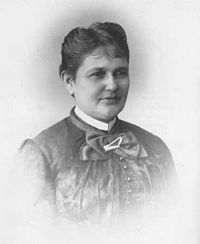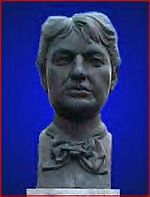- Lola Rodríguez de Tió
-
Lola Rodríguez de Tió 
Lola Rodríguez de TióBorn Dolores Rodríguez de Astudillo y Ponce de León
September 14, 1843
San Germán, Puerto RicoDied November 10, 1924
Havana, CubaOccupation poet Nationality Puerto Rican Lola Rodríguez de Tió[note 1], (September 14, 1843-November 10, 1924), was the first Puerto Rican born poetess to establish herself a reputation as a great poet throughout all of Latin America.[1] A believer in Women's Rights, she was also committed to the abolition of slavery and in the independence of Puerto Rico.
Contents
Early years
Rodríguez de Tió (birth name:Dolores Rodríguez de Astudillo y Ponce de León) was born in San Germán, Puerto Rico. Her father, Sebastián Rodríguez de Astudillo, was the founder of the Colegio de Abogados de Puerto Rico (College of Law of Puerto Rico) and her mother, Carmen Ponce de León, was a descendant of Juan Ponce de León. Rodríguez de Tió received her education at home where she was home-tutored. She developed a life-long love for literature, especially for the works of Fray Luis de León which were to serve her as a source of inspiration. She was very assertive in her early years, at the age of seventeen she demanded to be allowed to wear her hair short, which went against the conventional norm of the time, a personal trademark that she kept through her life.
Political activist
Rodríguez de Tió moved to Mayagüez, with her family. There she met Bonocio Tió Segarra, whom she married in 1863. Rodríguez de Tió became a writer and book importer who often wrote articles in the local press and was as much of an activist against the Spanish regime as was allowed by the government. After marrying Tió, she published her first book of poetry,"Mis Cantos" which sold the then amazing amount of 2,500 copies.[2]
In 1867 and then again in 1889, Rodríguez de Tió and her husband were banished from Puerto Rico by the Spanish appointed Governors. On their first exile they went to Venezuela and on their second banishment they first moved to New York where she helped José Martí and other Cuban revolutionaries, and later to Cuba, where the couple resided until their respective deaths. Their home became a gathering point for politicians and intellectuals as well as exiled Puerto Ricans. In 1868, inspired by Ramón Emeterio Betances's quest for Puerto Rico's independence and by the attempted revolution called the Grito de Lares, she wrote the patriotic lyrics to the existing tune of La Borinqueña. In 1901, Rodríguez de Tió founded and was elected member to the Cuban Academy of Arts and Letters. She was also an inspector of the local school system. She was well known in Cuba for her patriotic poetry about Puerto Rico and Cuba.[2] Some of Rodríguez de Tió's best known works are "Cuba y Puerto Rico son..." (Cuba and Puerto Rico are..) and "Mi Libro de Cuba" (My Book about Cuba).
In 1919, Rodriguez de Tió returned to Puerto Rico where she was honored with a great banquet at the Ateneo Puertoriqueño after she recited her "Cantos a Puerto Rico". Lola Rodríguez de Tió died on November 10, 1924 and is buried at the Colón Cemetery in Havana, Cuba.[2]
It is believed by some that the design and colors of the Puerto Rican Flag, which were adopted in 1954, came from Rodríguez de Tió's idea of having the same flag as Cuba with the colors reversed. Puerto Rico has honored Lola's memory by naming schools and avenues after her.[3]
Lyrics to the revolutionary version of "La Boriqueña"
 External audio
External audio
You may listen to Rodríguez de Tió's version of the "La Borinqueña" interpreted by Puerto Rican singer Danny Rivera here. The following are the lyrics to Lola Rodríguez de Tió's 1868 revolutionary version of "La Boriqueña":
Revolutionary version of "La Boriqueña"
by Lola Rodríguez de TioSpanish
(original version)English
translation¡Despierta, borinqueño
que han dado la señal!
que es hora de luchar!
¡Despierta de ese sueñoArise, Puerto Rican!
The call to arms has sounded!
for it is time to fight!
Awake from this dream,A ese llamar patriótico
¿no arde tu corazón?
el ruido del cañón.
¡Ven! Nos será simpáticoDoesn't this patriotic call
set your heart alight?
with the roar of the cannon.
Come! We will be in tuneMira, ya el cubano
libre será;
su libertad.
le dará el machete
su libertad...
le dará el macheteCome, the Cubans
will soon be free;
liberty.
the machete will give him hisYa el tambor guerrero
dice en su son,
de la reunión.
que es la manigua el sitio,
el sitio de la reunión,
de la reunión...Now the war drum
says with its sound,
of the meeting.
that the countryside is the place
of the meeting...El Grito de Lares
se ha de repetir,
vencer o morir.
y entonces sabremosThe Cry of Lares
must be repeated,
victory or death.
and then we will know:Bellísima Borinquén,
a Cuba hay que seguir;
que quieren combatir.
tú tienes bravos hijosBeautiful Puerto Rico
must follow Cuba;
who wish to fight.
you have brave sonsya por más tiempo impávido
no podemos estar,
dejarnos subyugar.
ya no queremos, tímidosNow, no longer
can we be unmoved;
to let them subjugate us.
now we do not want timidlyNosotros queremos
ser libre ya,
afilado está.
y nuestro machete
afilado está.
y nuestro macheteWe want
to be free now,
has been sharpened.
and our machete¿Por qué, entonces, nosotros
hemos de estar,
a esa señal, a esa señal?
tan dormidos y sordos
y sordos a esa señal?Why then have we
been so sleepy
to the call?
and deafNo hay que temer, riqueños
al ruido del cañón,
es deber del corazón!
que salvar a la patriaThere is no need to fear, Puerto Ricans,
the roar of the cannon;
is the duty of the heart.
saving the motherlandya no queremos déspotas,
caiga el tirano ya,
también sabrán luchar.
las mujeres indómitasWe no longer want despots,
may the tyrant fall now;
also will know how to fight.
the unconquerable womenNosotros queremos
la libertad,
nos la dará...
y nuestros machetes
nos la darán...
y nuestro macheteWe want liberty,
and our machetes
will give it to us...
will give it to us...
and our machetesVámonos, borinqueños,
vámonos ya,
¡La libertad, la libertad!
que nos espera ansiosa,
ansiosa la libertad.Come, Puerto Ricans,
come now,
freedom, freedom!
for freedom awaits for us
anxiously,Memorial Plaque
Ancestors of Lola Rodríguez de Tió
Ancestors of Lola Rodríguez de Tió 8. 4. Francisco José Rodríguez de Astudillo
b. 1761 Cumaná, Sucre, Venezuela [4]9. 2. Don Sebastián Rodríguez de Astudillo-Ramírez del Postigo 10. Francisco Xavier Ramírez del Postigo-Vidal
b. 1735, Montilla, Córdova, Spain5. María del Socorro Ramírez del Postigo-Ortiz de la Peña
b. 1788, San Germán, Puerto Rico11. María Candelaria Ortiz de Peña-Del Toro
b. 1745, Montilla, Córdova, Spain1. Dolores (Lola) Rodríguez de Astudillo y Ponce de León
b. 1848, San Germán, Puerto Rico [5]12. Clemente Antonio Ponce De Leon y De La Seda
b. 1761, San Germán, Puerto Rico [8]6. Don José Antonio Ponce de León Del Toro y Quiñones
b. 1792, San Germán, Puerto Rico [7]13. Baltazara Del Toro y Quiñones Rodriguez
b. 1792,3. Doña María del Carmen Ponce de León y Martínez Mariño
b. San Germán, Puerto Rico [6]14. Zenón Martínez
b. Benafalsa, Castile, Spain7. Doña María Vicenta Martínez Mariño 15. María Mariño
b. Pontevedra, Galicia, SpainSee also
- María de las Mercedes Barbudo
- Mariana Bracetti
- Blanca Canales
- Lolita Lebron
- List of Puerto Rican writers
- List of famous Puerto Ricans
- Puerto Rican literature
Notes
- ^ This name uses Spanish marriage naming customs; the first is the maiden family name " Rodríguez" and the second or matrimonial family name is "Tió".
References
- ^ Toledo, Josefina, Lola Rodríguez de Tió - Contribución para un estudio integral, Librería Editorial Ateneo, San Juan, Puerto Rico, 2002
- ^ a b c Lola Rodríguez de Tió - Bio
- ^ Puerto Rican Flag
- ^ Don Francisco José Rodríguez de Astudillo
- ^ Rodríguez de Astudillo
- ^ Doña Carmen Ponce de León y Martínez Mariño
- ^ Nuevas fuentes para la historia de Puerto Rico - Page 545
- ^ Clemente Antonio Ponce de León (1761-1811) casado con Baltazara del Toro y Quiñones
Categories:- 1843 births
- 1924 deaths
- People from San Germán, Puerto Rico
- Puerto Rican poets
Wikimedia Foundation. 2010.


